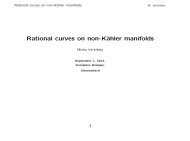Discrete Holomorphic Local Dynamical Systems
Discrete Holomorphic Local Dynamical Systems
Discrete Holomorphic Local Dynamical Systems
You also want an ePaper? Increase the reach of your titles
YUMPU automatically turns print PDFs into web optimized ePapers that Google loves.
296 Dierk Schleicher<br />
made possible detailed studies of particular maps; most often, quadratic polynomials<br />
as the simplest non-trivial holomorphic mappings were studied. While a number<br />
of deep questions on quadratic polynomials remain, interest expanded to specific<br />
(usually complex one- or two- dimensional) families of holomorphic maps, such<br />
as quadratic rational maps, cubic polynomials, or other families in which critical<br />
orbit relations reduced the space to simple families of maps: for instance, families<br />
of polynomials of degrees d ≥ 2 with a single critical point of higher multiplicity.<br />
Only in recent years has the progress achieved so far allowed people to shift interest<br />
towards higher-dimensional families of iterated maps, such as general polynomials<br />
of degree d ≥ 2. The study of iterated rational maps, as opposed to polynomials,<br />
seems much more difficult, mainly because of lack of a good partition to obtain<br />
a good encoding for symbolic dynamics: the superattracting fixed point at ∞, and<br />
the dynamic rays emanating from it, are important ingredients for deep studies of<br />
polynomials that are not available for general rational maps. A notable exception<br />
are rational maps that arise from Newton maps of polynomials: for these, it seems<br />
that good partitions for symbolic dynamics are indeed possible.<br />
Transcendental iteration theory has been much less visible for a long time, even<br />
though its study goes back to Fatou (we will even treat a question of Euler in<br />
Section 4), and a solid body of knowledge has been developed by Baker and coauthors,<br />
and later also by Eremenko and Lyubich and by Devaney and coauthors, for<br />
more than four decades. Complex dynamics is known for employing methods from<br />
many different fields of mathematics, including geometry, complex analysis, algebra<br />
and even number theory. Transcendental dynamics unites two different general<br />
directions of research: there is a substantial body of knowledge coming from value<br />
distribution theory that often yields very general results on large classes of iterated<br />
transcendental functions; among the key contributors to this direction of research are<br />
Baker, Bergweiler, Eremenko, Rippon, and Stallard. The other direction of research<br />
sees transcendental functions as limits of rational functions and employs methods<br />
adapted from polynomial or rational iteration; here one usually obtains results on<br />
more specific maps or families of maps, most often the prototypical families of<br />
exponential or cosine maps; this direction of research was initiated by Devaney<br />
and coauthors. Others, like Lyubich and Rempe, have worked from both points<br />
of view.<br />
In recent years, transcendental iteration theory has substantially gained interest.<br />
There have recently been international conferences specifically on transcendental<br />
iteration theory, and at more general conferences transcendental dynamics is obtaining<br />
more visibility.<br />
In this survey article, we try to introduce the reader several aspects of transcendental<br />
dynamics. It is based on lecture notes of the CIME summer school held in<br />
Cosenza/Italy in summer 2008, but substantially expanded. The topic of that course,<br />
“dynamics of entire functions”, also became the title of this article. We thus focus<br />
almost entirely on entire functions: their dynamical theory is much simpler than the<br />
theory of general meromorphic transcendental functions, much in the same way that<br />
polynomial iteration theory is much simpler (and more successful) than rational iteration<br />
theory. However, we believe that some of the successes of the polynomial



